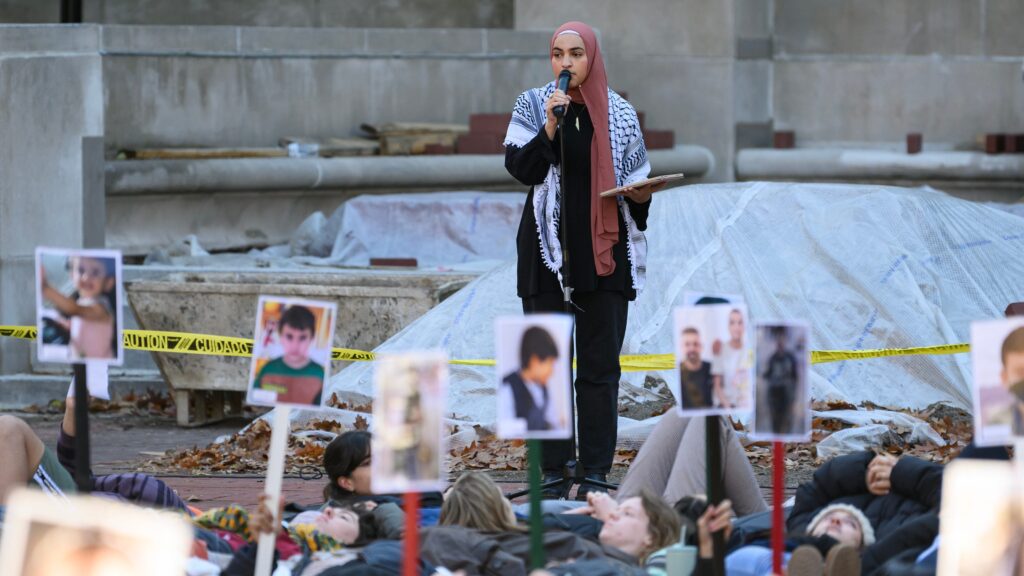A University of Michigan student group dedicated to Palestinian liberation has been cut off from university funding for two years for actions that university officials said violated UMs policies, including creating a threat of harm to a regent.
The Students Allied for Freedom and Equality group called the allegations baseless and supporters said this is just the university’s latest effort to silence pro-Palestinian voices.
UM Director of Public Affairs Kay Jarvis said Friday the suspension stems from actions at the home of Regent Sarah Hubbard in May and during Festifall, an annual on-campus event highlighting student groups.
“Protests are welcome at UM, so long as those protests do not infringe on the rights of others, significantly disrupt university events or operations, violate policies or threaten the safety of the community,” Jarvis said in a statement. “The university has been clear that we will enforce our policies related to protests and expressive activity, and that we will hold individuals and student organizations accountable for their actions in order to ensure a safe and inclusive environment for all.”
The university filed a complaint that was adjudicated through UM’s Student Organization Advancement & Recognition (SOAR) Accountability Process, which on Jan. 16 found that SAFE had violated the university’s Standards of Conduct.
SAFE said this decision came only after a student judicial panel urged the university not to suspend the group.
“By suspending the only student organization dedicated to fighting for the Palestinian liberation for over 20 years, the university is attempting to erase Palestine from our campus,” SAFE posted on X. “As the world and the university attempts to erase Palestine, we refuse to be complicit.”
UM said SAFE violated the university’s conduct standards at Hubbard’s residence because they “posed an obvious and serious threat or harm to a member of the university community.” During Festifall, the group violated policies including the appropriate use of space, UM said.

In May, pro-Palestinian protesters said they had “decorated” the front lawn of Hubbard’s home in Meridian Township with “scenes of genocide in Palestine” and taped documents listing demands for divestment from Israel to the door of her home. The demonstrators arrived at the house around 6 a.m. Police were dispatched, but no arrests were made.

Hubbard told The Detroit News in May that about 30 people showed up at her home, with some wearing masks or having their heads covered. They put tents and body bags that are used as part of campus protests on her property, she said.
“The best way to solve differences of opinion is through persuasion and facts,” Hubbard told The News. “Disrupting neighborhoods that have no engagement in the topic at hand does not move your argument forward.”
During the suspension, SAFE will not have access to university funding and cannot reserve university spaces, Jarvis said.
The group can return to recognized status in a year if its leadership “engage in a series of educational conversations and demonstrate an understanding of university policies,” according to the statement.
SAFE has until Thursday to appeal the suspension, UM said.
In August 2024, the university announced updates to its policies governing investigations of student misconduct aimed at curbing disruptions of school events. Among the changes was a specification that people who use UM facilities aren’t allowed to violate the law or university protocols, “disrupt the lawful, authorized activities of others,” block human or vehicle traffic and use a facility “in a way that the university has not made available for that purpose.”
The Michigan Chapter of Council on American Islamic Relations said the changes unfairly gave final decision-making power over complaints to university administrators.
“There is fundamental irony in the fact that the University of Michigan wants to act as both the complaining witness and the judge, jury and executioner while still claiming to promote free speech on campus,” said CAIR-MI Staff Attorney Amy V. Doukoure. “In no way can the university plausibly claim that the suspension of SAFE was anything but a targeted aimed at silencing Pro-Palestinian voices on campus.”
‘Our movement is under attack’
The suspension is the latest development in the tense back-and-forth between pro-Palestinian activists and university leadership that escalated after Hamas’ attack on Israel on Oct. 7, 2023, and Israel’s counterattack.
University events have been disrupted by demonstrators, an encampment was built on campus for a month before being dismantled by police, and regents and other university leaders have been targeted with protests and vandalism. The demonstrators have demanded UM divest its investment holdings from Israel-related companies, which university leaders and the regents have rejected.
In December, six current or former UM students who protested to try to get the university to divest filed a class action lawsuit against the university, saying their free speech and due process rights were violated and that they were discriminated against for their pro-Palestine views.
In September, 11 people were charged with crimes connected to a pro-Palestine encampment on the Diag in April and May.
Earlier this month, Israel and Hamas agree to a ceasefire, which persists tenuously.
“However, the bombing and shooting of Gazans has not ended,” SAFE said on X. “The university’s ploy to get us to stop just because of a ban and a ceasefire will not work. When our movement is under attack, we only end up stronger.”
mreinhart@detroitnews.com

